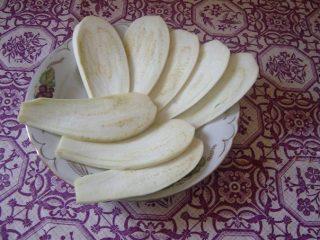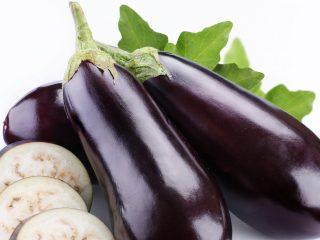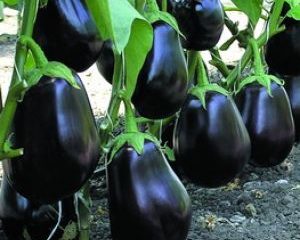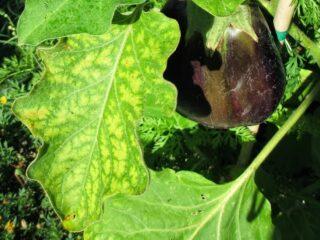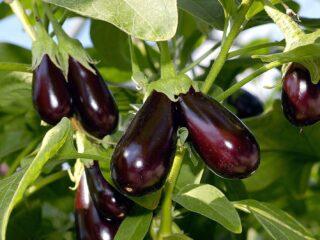Content
Eggplant Vera is a domestic variety that is adapted to the conditions of the Russian climate. It is valued for its high percentage of commercial fruit yield, versatility of use and stable yield even in unfavorable seasons for the crop. But in order for this species to meet the declared characteristics, it is necessary to properly sow, plant seedlings in a permanent place and provide appropriate care.
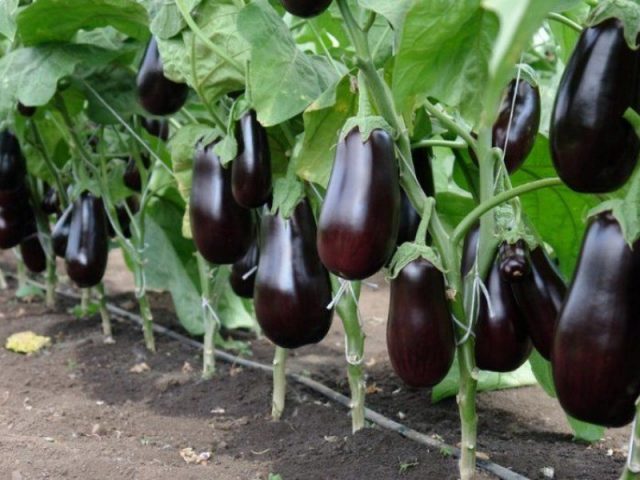
Eggplant Vera is suitable for private cultivation
History of selection
This variety appeared thanks to the selection work carried out by employees of the Federal Center for Vegetable Growing, which is located in the Moscow region. As a result of careful selection, a species with stable characteristics was obtained. An application for variety testing was submitted in 1998, and already in 2001, Vera eggplant was included in the State Register of Russia.
Description and characteristics of Vera eggplants
The variety has some characteristic differences, which sets it apart from others. This applies to the appearance of bushes, fruits, as well as the timing of crop ripening and productivity.Knowing the characteristics of the Vera eggplant, you can accurately determine the variety.
Appearance
Depending on the region of cultivation and weather conditions, the height of the bushes of this type of crop can reach 73-105 cm. The plants are medium-leaved, powerful, but not spreading. Therefore, close planting of seedlings on the site is allowed.
The leaves of the Vera eggplant are typical for the crop, medium in size, dark green. The plates are notched along the edge, with a rough surface. The veins on them are dark purple. Flowers appear from the axils of the leaves, large, drooping. The buds have a blue-violet tint. They can be solitary or collected in inflorescences of 2-3 pieces. The flower calyx is covered with sparse small spines.
The fruits of the Vera eggplant are pear-shaped, up to 20 cm long. Their average weight is 125-180 g, but there are specimens weighing about 300 g. When ripe, the fruits acquire a uniform, rich purple hue. Their skin is smooth, shiny, glossy. The pulp of eggplants of the Vera variety is whitish in color, dense in consistency, without voids.
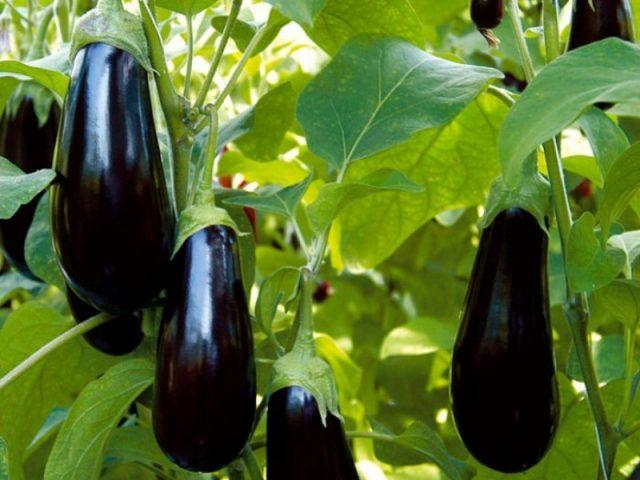
It is recommended to form bushes in 3-5 branches
Taste and purpose
The taste of the variety is assessed as excellent. They fully manifest themselves after heat treatment. The Vera variety belongs to the universal category. Its fruits can be fried and stewed. The harvest is also suitable for preparing various snacks, salads, and winter preparations.
Ripening time
Vera is an early ripening variety of crop. The duration of its growing season is 110-118 days. The harvest reaches technical maturity in late August-early September.
Eggplant yield Vera
Eggplant Vera is valued for its stable fruiting. This is due to its increased resistance to adverse weather conditions and temperature changes. However, the productivity of the variety is lower than that of industrial species. The yield of Vera is 1.2-2.8 kg per 1 sq. m.
Growing regions
Despite the thermophilic nature of eggplants, the variety is suitable for cultivation in the central and northern regions of the country. According to the State Register, Vera shows high productivity in the Ural, West Siberian and Far Eastern regions.
Advantages and disadvantages
This variety of crop has many advantages, which is confirmed by reviews from gardeners. But the Vera eggplant also has certain disadvantages that need to be studied in advance.
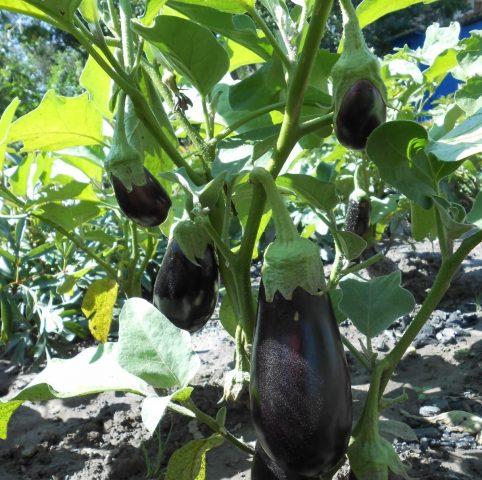
No more than ten fruits should be left on one plant
Main advantages:
- stable yield;
- excellent presentation of the fruit;
- versatility of application;
- lack of bitterness;
- early maturation;
- low seed;
- resistance to temperature changes;
- low maintenance;
- suitability for transportation and long-term storage.
Flaws:
- spiny sepals;
- average yield;
- needs treatment against diseases and pests.
Growing seedlings
It is recommended to grow Vera eggplant using seedlings. It is recommended to sow seeds of the variety at home in late February-early March. In this case, the seedlings will be 65-70 days old at the time of planting.
For planting, you will need wide containers, at least 10 cm high. They must have drainage holes to remove excess water when watering. It is recommended to fill the containers with nutrient substrate.You can buy it in the store, choosing it marked “for seedlings,” or prepare it yourself by mixing turf, peat, leaf soil, sand and humus in a ratio of 2:1:1:1:1. You also need to additionally add perlite to the soil mixture at the rate of 0.5 liters per 10 liters, and then stir until a homogeneous consistency is obtained.
Two days before sowing Vera eggplant seeds, it is necessary to disinfect the soil, which will eliminate the possibility of seedlings being damaged by fungal diseases at the initial stage of development. To do this, you need to pour the substrate with a bright pink solution of potassium permanganate, and then dry it slightly.
Plant the seeds in moistened soil to a depth of 0.5 cm, keeping a distance of 2 cm. At the end of the procedure, cover the container with film and transfer to a dark place with a temperature of +23-25 ° C. When friendly shoots appear, the container should be moved to a bright window sill and the maintenance regime should be lowered to +20 °C.
In the future, you need to provide eggplant seedlings with standard care, which involves moderate watering and regular ventilation of the seedlings. And when the plants grow and become stronger, they need to be adapted to external conditions and the film must be completely removed.
Vera eggplant seedlings need to be plucked at the stage of two true leaves. To do this, you can use a similar substrate as when planting and containers with a volume of 200-300 ml. When transplanting, it is necessary to take seedlings with an earthen lump on the roots. Two weeks after this, the first fertilizing should be done with a complex mineral fertilizer intended for seedlings.
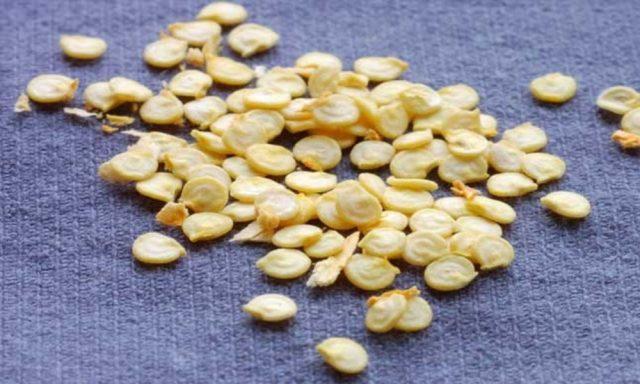
The collected Vera eggplant seeds are suitable for planting next year
Transplanting seedlings into the ground
It is necessary to transfer the seedlings to a permanent place when the soil has warmed up sufficiently and the air temperature will confidently remain above +14 °C. But before this, Vera eggplant seedlings need to be hardened off. To do this, it is recommended to take it outside for the first time a week before transplantation and leave it for an hour in a shaded place. With each subsequent day, the time interval should be increased by half an hour.
The recommended planting scheme for Vera eggplant is four seedlings per 1 sq. m. Plants need to be planted in holes whose size is equal to the volume of the root system. It is not recommended to bury seedlings. After the procedure, water them generously. By the time of planting, the plants should have 5-6 leaves.
Further care
The variety does not require complex care; just follow the standard rules of agricultural technology and then a good harvest is guaranteed.
Vera eggplants need to be watered regularly in the absence of rain for a long time. To do this, you need to use settled water at a temperature of + 20 °C. Irrigate at the root so that moisture does not fall on the leaves. The frequency of watering is 1-2 times a week, depending on the air temperature. During particularly hot periods, it is recommended to lay mulch at the base of the Vera eggplant bushes to prevent excessive evaporation.
It is also necessary to regularly weed the crop plantings and loosen the soil at the base of the plants to maintain air access to the roots. The variety needs the formation of bushes. It is recommended to select 3-5 main shoots, and remove the remaining stepsons growing below the fork.It is also necessary to control the amount of ovary so that the quality of the fruit corresponds to the declared characteristics of the species.
Eggplant Vera needs a moderate amount of nutrients in the soil. Therefore, it needs to be fed two weeks after planting in open ground and at the stage of fruit formation. In the first case, you need to use chicken manure 1:15 or mullein 1:10, and in the second, potassium monophosphate in a proportion of 10-15 g per 10 liters of water. You need to use a nutrient solution to water the bushes at the rate of 1 liter for each.
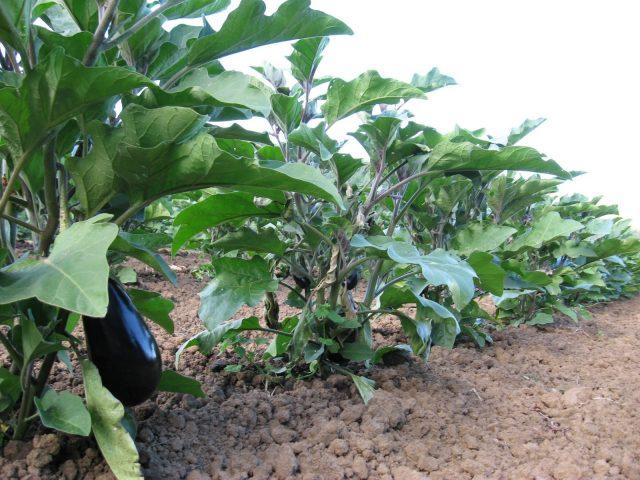
Fertilizing should be done in moist soil to avoid burning the roots.
Eggplant Vera is affected by late blight. Therefore, as a preventative measure, it is recommended to treat it with fungicides every two weeks during growth. The variety is also susceptible to attack by the Colorado potato beetle. If alarming signs appear, insecticides must be immediately applied to prevent the mass spread of the pest.
Conclusion
Eggplant Vera is a stable variety that performs well in regions with difficult climatic conditions. After all, it easily tolerates temperature changes, does not require complex care and is characterized by high quality fruits. Therefore, many gardeners give preference to it, despite the average level of productivity.
Reviews from gardeners about the eggplant variety Vera

